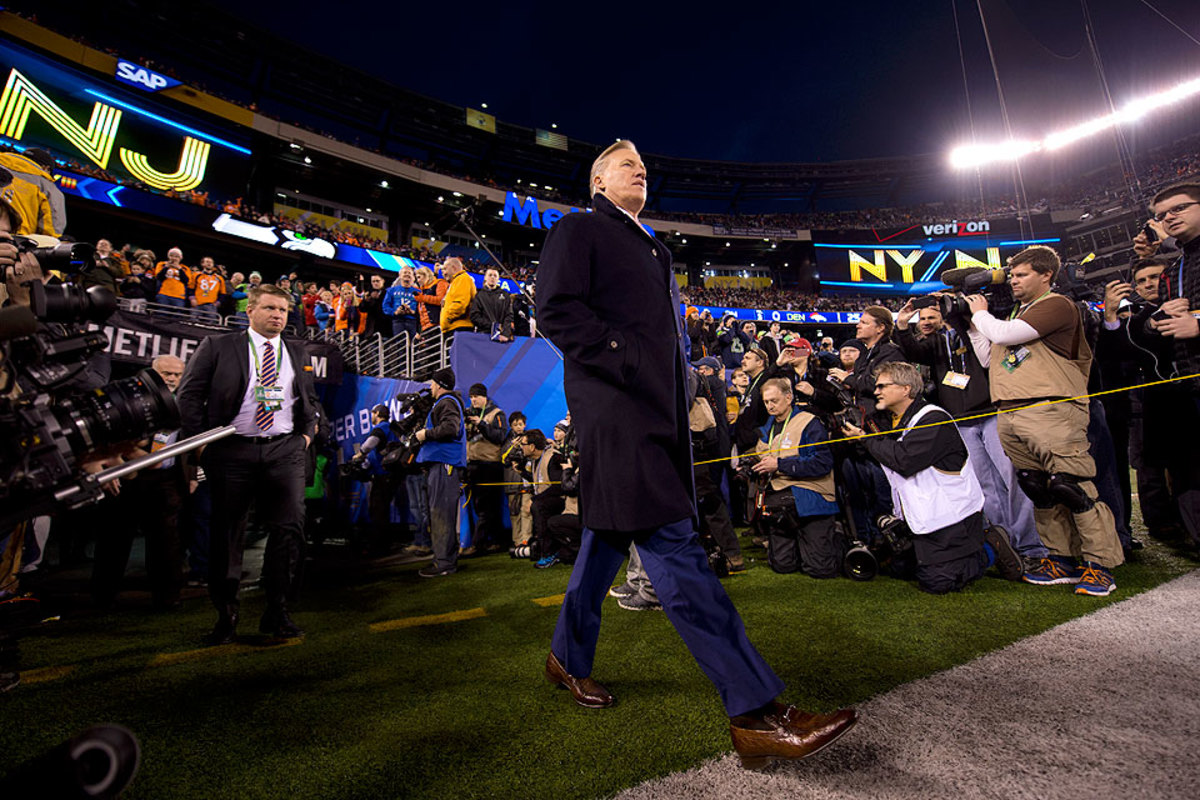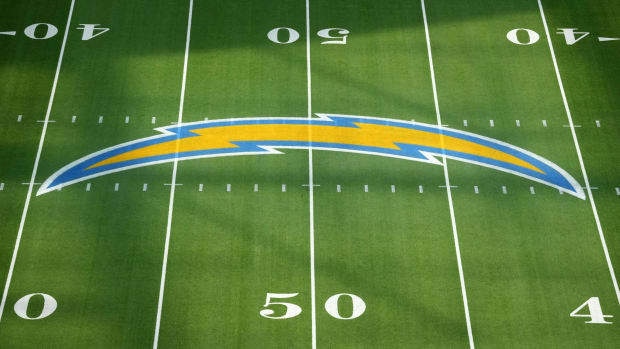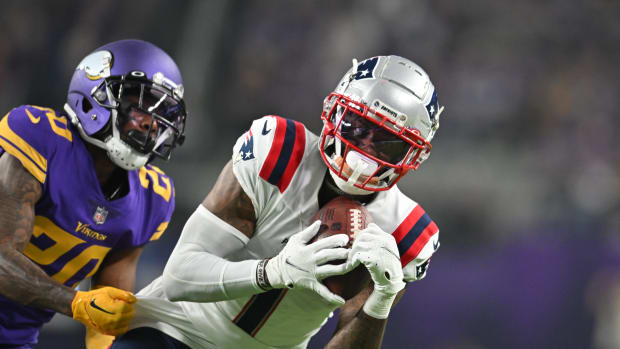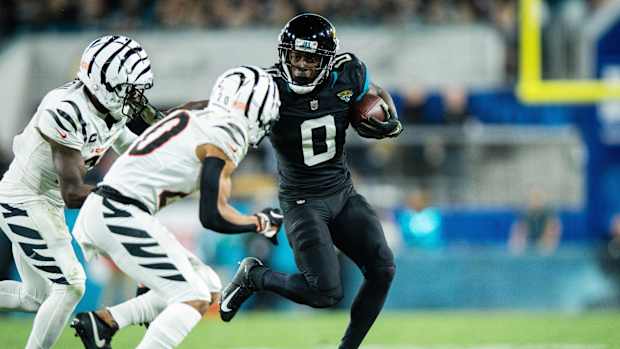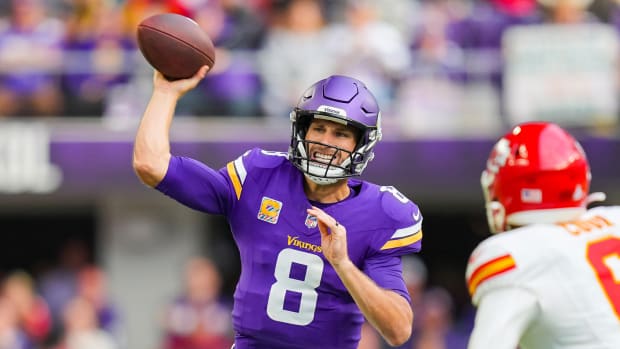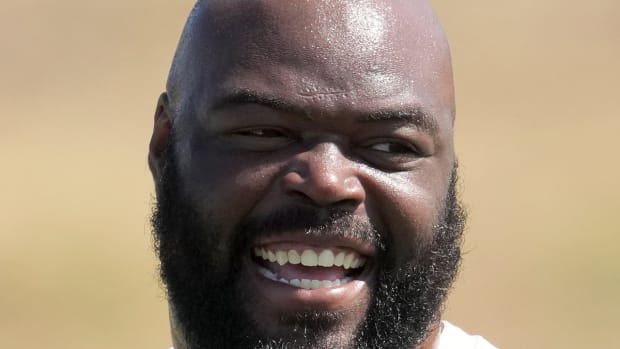Building a Better Bronco
Ernie Accorsi wanted encouragement. It was January 1988, and the Cleveland Browns general manager was preparing his team to face the Denver Broncos in the AFC championship game for the second straight season. Just a year had passed since “The Drive,” when John Elway led his Broncos 98 yards for a game-tying touchdown in the final minute of regulation, and the Browns ached for revenge.
Before the game, longtime sportswriter Art Spander, who had covered Elway since the quarterback’s high school days, struck up a conversation with Accorsi. The subject naturally turned to Elway, and Spander offered his wisdom on the player he’d followed for more than a decade. “There’s no sense in being nervous, Ernie,” he told Accorsi. “You can’t beat him."
The Browns lost that day—and again the next year—to Elway and company, a fact that stung just a bit sharper for Accorsi. As Baltimore’s GM, he was the man who’d drafted Elway in 1983 despite the quarterback’s assurances he would never play for the Colts. Elway kept his word, forced a trade to Denver, and he and Accorsi parted ways after meeting just once, with a brief handshake at the East-West Shrine Game.
In 2009, 20 years after that final Denver-Cleveland AFC championship matchup, two men met at the Yale Club in midtown Manhattan. One was Accorsi, the other Broncos president Joe Ellis, who was seeking counsel after firing Mike Shanahan. Ellis valued the advice he got that day, so much so that two years later he suggested his new vice president of football operations call Accorsi for similar counsel.
That vice president was, of course, Elway, who laughed at the suggestion. Ellis didn’t know the history, and Elway wondered if Accorsi would even take his call.
Ellis reached out to gauge Accorsi’s interest in mentoring the man he calls the “greatest prospect I’d ever seen,” and who later ruined his draft in Baltimore and ended his Cleveland team’s postseason run three times. Accorsi had to laugh. He’d be happy to talk to Elway, he said. On that first phone call, the two hit it off. They discussed everything from the minutiae of the job to the big picture, building teams and winning championships.
“We were speaking the same language,” Accorsi says. “I am not in any way surprised by his success. Not a bit.”
* * *
Shortly before that first conversation with Accorsi, on Jan. 5, 2011, Elway stood behind a podium at Dove Valley, the Broncos’ facility in Englewood, Colo. Press conference flirted with pep rally as Ellis introduced the team’s newest hire. Elway’s words came quickly, so fast that a sentence was an exercise in slowing and repeating, unjumbling the jumbled. For Elway to smile so wide and speak concurrently was a feat of verbal gymnastics. Denver’s golden boy had swooped in to the rescue, boisterous, greener than green, talking, talking, talking.
Elway arrived at his hiring press conference in 2011 with guns blazing and gums flapping, answering all questions that came his way. (Ed Andrieski/AP)
When the Broncos announced the hire after a 4-12 season in 2010, their decision was met with mixed reactions. Was Denver hoping to resuscitate fan support after a disastrous season by using Elway as a figurehead? What qualifications had the quarterback garnered since retiring in 1999 after his second Super Bowl win? Looking back three and a half years later, the worries seem outlandish, the questions frivolous, but they existed, and Elway has answered them, one by one.
In that introductory press conference, the words that rang truest were perhaps the simplest Elway uttered all day: “I know what I don’t know.” He didn’t know the NFL of 2011, and he didn’t know what it would be like to make decisions of the magnitude he was about to make. What he did know was football, and how to build, albeit on a smaller scale.
From 2003 to 2009, Elway had been a co-owner of the Arena Football League’s Colorado Crush. He had also served as the team’s chief executive officer, building it from its inception and making its personnel decisions. His role with the Crush resembled that of an old-school NFL general manager, Accorsi says, in that “when you run an Arena League team, you don’t have a staff like General Eisenhower in England.”
“I … got my hands in everything, whether it be on the business side, sponsorship side, as well as the player side,” Elway says. “I learned probably more about the business side of sports than I did on the football side. … I hired everybody in the organization, putting together a coaching staff as well the business staff.”
That experience caught Ellis’s eye as he sought to jolt the Broncos back to relevance in 2011, and it remains the foundation of Elway’s approach five years after the AFL folded. Even as the Broncos played up Elway’s career and ties to Denver in the days after they hired him, they knew he would deliver, for reasons beyond his status in the Mile High City.
“He’s very competitive,” says Mike Dailey, who coached the Crush under Elway. “It’s a little bit like an aura for him. I think part of it is that everyone knows of him. [Players and coaches] could probably go into relationships with [him] knowing, Hey, here’s a guy who’s been successful at the highest level. But he has that aura about him. He wants to win. He wants to be the best.”
I think John Elway would still be playing football if he could physically,” Peyton Manning says.
The first season after Elway took over the Broncos went 8-8 and won the AFC West, capping the season with a playoff win. It was more success than most expected, and by then Elway’s talking had moved behind the scenes, from press conference to plotting. In public, he paced. Watching the first step in his team’s turnaround was no easy task, especially on Sundays. There was twitching, and there was head-shaking. There were attempts to suppress emotions that sometimes failed. “I think John Elway would still be playing football if he could physically,” Peyton Manning says, and those early games were a testament to that truth. Every play, every mistake, every success—each made Elway want to suit up, except that he was a decade retired. He was in charge but never quite in control.
Denver's direction changed course when Peyton Manning told Pat Bowlen and John Elway he was signing with the Broncos. (Joe Amon/Getty Images)
Three years later, in 2014, with three seasons, three playoff berths and a Super Bowl loss behind him, Elway presides. He stands on the practice field during the Broncos’ organized team activities, dressed as if he’s just rolled in from his tee time—because sometimes he has. He’s learned to watch games without his blood pressure spiking. He reclines in his office chair, surrounded by framed copies of Sports Illustrated bearing his much-younger image and photos of him with his family and Broncos owner Pat Bowlen. His is the comfort of a man who knows his job inside and out, who’s drafted four classes and paraded through free agency as many times.
Now, it seems like there is nothing Elway doesn’t know. These are his Broncos, and he is their king. He knows every step to take, every detail of what he’s done—except, of course, the one detail that got him to where he is today, at the top of the football world.
Elway got the call on March 19, 2012. On the line was Manning, informing him that he would sign with the Broncos, catapulting the team back into Super Bowl contention, with the chance of another golden era. Elway wined and dined Manning earlier that winter, presenting him with a city whose passion for football looms larger than the Rocky Mountains. He hammered home his belief that quarterbacks can win late in their careers, and then he waited. When the call came, Elway was thrilled, surprised, honored.
And he never asked why.
“I’m not sure he would answer it if I did,” Elway says after a long sigh. “Having played here and lived here for so long, to be able to present the Broncos the way that we presented them, to say, Hey, this is it, I thought we had a lot to offer.”
Elway doesn’t need to know why Manning chose his team. Never has, never will. His was the faith of a quarterback who’s thrown the perfect pass. It will land true. And if it doesn’t? Well, it wasn’t for lack of precision.
Tim Tebow went 7-4 as a starting quarterback in 2011, and led the Broncos to a win in the playoffs, but was traded by Elway in the offseason. (Eric Bakke/AP)
Elway’s time rebuilding in Denver reads like a laundry list of successes. Establish a foundation. Axe Tim Tebow. Court Manning. Add more free agents, some at bargain prices. Win the AFC. Win free agency, resoundingly so, on the heels of a Super Bowl loss. Only two postseason games stand as blemishes on Elway’s pristine résumé, and after both he went about free agency like it was his own playoff game to win, to even the score.
“We knew Peyton [alone] wasn’t going to win championships for us,” Elway says. “Teams win championships. Individuals don’t.”
On the day Elway was hired, Broncos owner Pat Bowlen laid out the expectations simply. “I think John will return this team to a very high level of competitiveness,” he said, “and I think we’ll win a few Super Bowls.” So far, Elway has done the former, but not the latter. With Manning just two years shy of 40, the stakes are higher, but Elway is delivering on par. In the first 48 hours of free agency this spring, Elway signed safety T.J. Ward and cornerback Aqib Talib, beefing up a defense that was shaky throughout 2013 and exposed in the Super Bowl. Then, when the team brought its two newest players in for a press conference March 12, buzz had already begun about yet another addition. Talib had been surprised to see a fellow Pro Bowler on his flight from Dallas that morning. Sure enough, by the time the cornerback was done at the podium Elway was back yet again, this time to trot out defensive end DeMarcus Ware, who’d agreed to a deal while the rest of Denver was still celebrating the two that came before.
By the end of that week Denver had added Emmanuel Sanders, who replaces Eric Decker in the team’s wide receiver corps. Decker was going to command too much money in free agency; Elway let him walk, knowing they could find a more than adequate replacement—especially with Manning under center—and that they needed the money to bulk up elsewhere. Elway also let running back Knowshon Moreno walk after a stellar season for similar reasons, knowing where to divert money and where Manning’s arm and offense could allow for cost-saving measures.
“They’re going to dish out the cash to win,” Sanders says. “When they said that they wanted me, they did whatever they needed to do to bring me here. If I could say one thing about [Elway], he’s a winner.”
So far, Elway’s free-agent pitch has been simple. Two words: Peyton Manning. “It wasn’t much convincing,” T.J. Ward says. “Money’s great, but at the end of the day, it’s all about winning.”
Perhaps the only criticism of Elway’s tenure in Denver has been the draft, which has been if not underwhelming, then at best average. Sure, the Broncos picked Von Miller second overall in the first months after hiring Elway, but since then, a star has yet to emerge. Montee Ball might be that guy—he’ll get reps as a starter next fall—and Elway still sticks by Brock Osweiler as Manning’s successor. But so far, there’s been no draft windfall. Elway did seem to be building for the future in 2014 when he selected receiver Cody Latimer in the second round, and Bradley Roby, the second-to-last pick of the first round, is shaping up as a steal. It’ll be awhile before any evaluation of Elway’s newest picks is due, and even his average performance drafting thus far shouldn’t be too pressing of a worry.
“We had the resources to be able to work and build through free agency rather than sit there and wait and build through the draft,” Elway says. “We’re able to get big free agents that we thought would come in, great football players but also guys we thought mentality-wise would fit. [We] could build faster because of it.”
So far, Elway’s pitch has been simple. Two words: Peyton Manning. That name conveys most of what Elway is selling, a team that took a risk on the best, that will stop at nothing to win. When Elway approaches a free agent, winning—past, present and future—is the crux of his message. He tells the player why the Broncos need him and what the expectations are, which brings him back, of course, to winning.
“Obviously money’s a big part of it, and security for you, but the bottom line is that when you come here, the mentality is that you’ve got to compete for a world championship,” Elway says.
Free agents hear the message, loud and clear. “It wasn’t much convincing,” Ward says. “Money’s great, but at the end of the day, it’s all about winning.”
* * *
When the Broncos called John Fox to interview for their head coaching job the same month Elway was hired, the coach was intrigued. Still, he had questions. Hiring Elway made a splash for fans, but from a front office perspective he was still unproven, and Fox didn’t have a clue how the Broncos planned to use him.
Under the leadership of Elway and coach John Fox, the Broncos have gone 37-17 including playoffs, with a 28-8 mark and an AFC title since Peyton Manning joined the fray. (John Biever/SI/The MMQB)
“I didn’t know if he was just going to be a figurehead,” Fox says. “But he made it clear he was going to be all-in, and he’s done a tremendous job. That was one of the things I wanted to get a feeling for, the hierarchy structure of the organization and if I thought it was going to work. I was very, very impressed.”
Elway was always going to be more than just a face for the team with which his name is synonymous. “The Denver Broncos are in my blood,” he said in his introductory press conference, and so too would he be in theirs. He wouldn’t have taken the job had it not involved the all-encompassing role he has today, a role he’d been planning for—however subconsciously—for years.
“When I was talking to John, I was struck with the same impressions I got from Ozzie Newsome,” Accorsi says. “I could tell that, number one, he was going to work at it—he had a tremendous amount of pride—but also that he had an understanding of the big picture.
“It was like Ozzie Newsome; they played with their eyes open. They knew everything that was going on around them.”
As a quarterback, Elway says, he paid special attention to his team’s personnel decisions each year, simply because his position relied so much on the players around it. From 1993-99, Elway’s father, Jack Elway, worked in the Broncos’ scouting department, and the two would discuss team building after each season. In that, Elway got a taste of his future.
“We want to win from now on,” Elway says. “It’s not about shooting for the moon, and having to rebuild three years later.”
The difference between playing quarterback, and running the franchise: “As a player, you think you know what you see, but obviously as a quarterback you don’t get everything you want [on the] personnel side,” he says, “nor do they really listen to you.”
Communication lies at the heart of what Elway has built in Denver. His biggest surprise upon taking the job, he says, was how much communication it requires. Managing personalities is at the top of his to-do list, and at times it hasn’t been easy. In his front-office role, Elway is the voice of the team when it comes to both successes and shortcomings. When two of the Broncos’ front office members were arrested a year ago for DUIs, it was Elway who had to comment. When a player misses a court date, it is his voice for which the media clamors. The same goes for when the team loses a big playoff game, which has happened twice in as many seasons; but at least his playing career prepared him for that.
Elway stresses that what he’s selling now is entertainment, which is a far cry from the cars he hawked for more than a decade in Colorado and California and the restaurant chain that bears his name in Denver. His product is people and an image as much as it is winning, which is why he’s tried to foster a culture of openness at the Broncos’ facility. Just as he used to pop into Dailey’s office when the two were with the Crush, Elway is nearly ever-present at Dove Valley. Several general managers had advised him that avoiding the road and keeping home base in order is the best way to approach his job. And at Dove Valley, Elway is at home. “He might be the most popular guy in our city,” Fox says.
* * *
Elway plans for the smiles—and the winning—to continue even after his 38-year-old QB hangs 'em up. (Ed Andrieski/AP)
For more than two years, Elway’s name has been inextricably linked with Manning’s. Denver has adopted its new quarterback with the fervor of a place that’s been wanting since Elway’s retirement, and though the Broncos have stumbled twice in two years in their quest for a title the promise of a third Super Bowl win looms over the Mile High City. Elway won his last Super Bowl at 38, the same age Manning turned in March. Denver has opened its wallet in a big way to make that championship happen, and yet Elway insists all the while that he is looking to do more than just win now, even if that’s the primary focus.
When anyone tells Elway that it looks like all he cares about is the present—and plenty have voiced that opinion—his answer is the same. “We want to win from now on,” he says, and he believes his team has the contract flexibility to do so. Whether that vision of the future involves the unproven Osweiler at quarterback remains to be seen, but if Elway has taught the football world anything since he took his job, it’s to trust him. “It’s not about shooting for the moon,” he says, “and having to rebuild three years later.” What he says is that he has a core that will persist into the future and the ability to fill the holes that will undoubtedly present themselves upon Manning’s retirement. What he doesn’t say is that there’s no reason he won’t just land on the moon again.
Former Broncos receiver Rod Smith, who was Elway’s teammate from 1994-98, knows his former quarterback’s resolve to be great. When the Broncos hired Elway, Smith believed the team would turn around, and quickly, yet he had little evidence other than his friend’s Hall of Fame playing career. Not two months into the Broncos’ first season under Elway, the two found themselves sitting on a plane together, bound for the funeral of Mike Heimerdinger, a former Broncos assistant. The two were devastated at the news of Heimerdinger’s death, but as they took off, Elway got down to business. He pulled out his tablet and began watching the previous week’s NFL games. He knew exactly where to look, exactly what he was looking for.
At the time the Broncos were 1-4 and questions remained. Yet as Smith watched his friend scrutinize that tablet, he knew. The turnaround had begun, and with that, Smith muttered three words to himself.
“Oh, it’s done.”
































